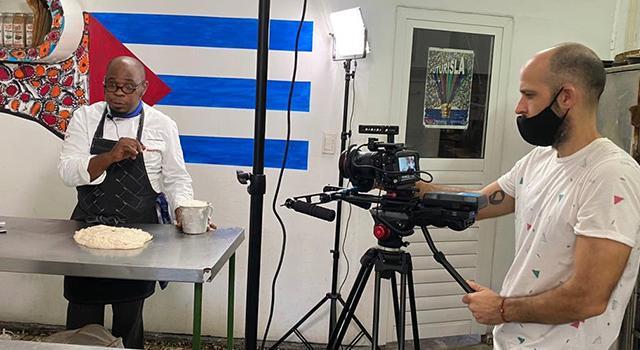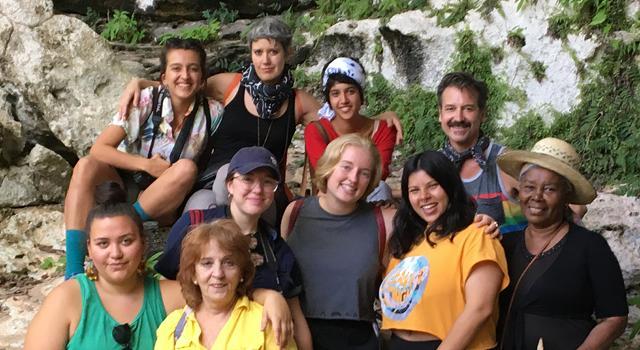Latin American Studies
Courses at Hampshire venture across these areas of study, considering how, why, and with what restrictions people, policies, money, and culture cross borders both within and between the United States and Latin America.
A student's work might be shaped as an investigation into economic and military relationships between the U.S. and Latin America, a study of the legacies of colonialism in the Américas, an examination of representations of Latin@s in the U.S. popular culture, a focus on transnational connections in Latin@ communities, or an examination of diasporic cultural forms such as hip hop in the U.S., the Caribbean, and Latin America.
Student Project Titles
- An Analysis of Sexuality in Cuban Literature
- Pa' Que Sepa: Ideals of Beauty and Identity in the Dominican Republic
- Between Indigenist Cambas and Indianist Chaqueños: Struggles for and Against Existing Social Hierarchies through Regionalist Identity Formation in Eastern Bolivian Social Movements
- Soperos: Cuban Buskers, Making Music Under the Revolution
- The Medical Gaze, Encrypted Space, and the Organized Body: Urban Transformation in Buenos Aires
Sample First-Year Course
Pa'lante: Raising Voices/Fostering Change
Antonio Gramsci, one of the leading activists and theorists of social movements, offered a theory of how power and resistance operate simultaneously. Similarly, Stuart Hall, one of the leading sociologists of the 20th century, also reminds us that power cultivates resistance. And in the context of the Americas, Latin Americans and U.S. Latin@s—along with other communities of color—have served as a vanguard for social change, articulating numerous forms of resisting Empire, sexism, racism, and class inequality. Employing a perspective that accounts for the primacy of gender, sexuality, class, and race, this tutorial will discuss and analyze community-based and transnational efforts to foster social transformation, including Zapatismo and other indigenous-based movements, the autonomous movements of Argentina, Chavismo in Venezuela, Caribbean Independence movements, as well as the U.S. Latin@ efforts around cultural and legal citizenship, labor, and educational rights. Multi-media presentations, guest speakers, and field trips will complement in-class discussions.
Sample Courses at Hampshire
- Border Matters: Mexico & the United States
- Brazil and the Atlantic World: The Making & (Re)Making of Racial & Gender Hierarchies
- The Cuban Revolution: Visions, Realities, Crisis & Collapse
- Elementary Spanish I & II
- Empires & Citizenship: Postcoloniality and Puerto Rican Communities
- Everyday Nightmares of Latin American Urban Culture
- From the Grassroots to the Streetroots: Urban Social Movements in Latin America
- Intermediate Spanish I & II
- Intro to Media Arts in Film, Photography & Video: Cuba
- Music & Politics of Latin America
- Music in Caribbean Culture & Society
- Penning the Dictator
- Social Movements & Social Change: Zapatismo
- Third World, Second Sex
- Trans Latino Cultural Studies
Through the Consortium
- Central America: Reaction & Reform (MHC)
- Colonial Latin America: 1492-1821 (SC)
- Intro to Latin American Cultures (MHC)
- Motherhood in the Americas (AC)
- National Latin America: 1821-Present (SC)
- Spanish Conversation (AC)
- Spanish Language & Lit (AC)
Facilities and Resources
Semester Study
Hampshire students have an exceptional opportunity to study for a semester in Havana, Cuba where they are tutored by members of La Union Nacional de Escritores y Artistas de Cuba (The National Union of Cuban Writers and Artists), also known as La UNEAC. Students live for the semester in a family-stay situation in the Vedado neighborhood of Havana.
Five College Center for Crossroads in the Study of the Americas
The Five College Center for Crossroads in the Study of the Americas (CISA) is dedicated to new teaching and scholarship on the Americas. Instead of adopting a North-South approach, CISA has developed a triangular model for its work, where the three sides are formed by the Old World (Africa, Asia, Europe), the polities of the New World, and the indigenous peoples of the Americas. This conception of the Americas as a crossroads seeks to promote an awareness of the material inter-relationality of migration, diaspora, and nationhood.



